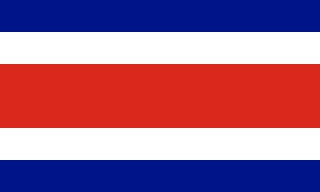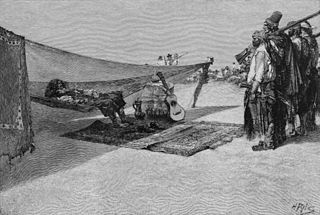
Nicaragua competed at the 2011 World Aquatics Championships in Shanghai, China between July 16 and 31, 2011.

Nicaragua competed at the 2011 World Aquatics Championships in Shanghai, China between July 16 and 31, 2011.
Nicaragua qualified 3 swimmers. [1]
| Athlete | Event | Heats | Semifinals | Final | |||
|---|---|---|---|---|---|---|---|
| Time | Rank | Time | Rank | Time | Rank | ||
| Omar Núñez | Men's 100m Freestyle | 56.76 | 80 | did not advance | |||
| Men's 1500m Freestyle | 17:41.77 | 27 | did not advance | ||||
| Athlete | Event | Heats | Semifinals | Final | |||
|---|---|---|---|---|---|---|---|
| Time | Rank | Time | Rank | Time | Rank | ||
| Fabiola Isabel Espinoza | Women's 50m Freestyle | 28.18 | 48 | did not advance | |||
| Women's 100m Freestyle | 1:03.54 | 60 | did not advance | ||||
| Dalia Torrez | Women's 50m Butterfly | 29.67 | 37 | did not advance | |||
| Women's 100m Butterfly | 1:05.71 | 43 | did not advance | ||||

Costa Rica, officially the Republic of Costa Rica, is a country in the Central American region of North America. It borders Nicaragua to the north, the Caribbean Sea to the northeast, Panama to the southeast, and the Pacific Ocean to the southwest, as well as maritime border with Ecuador to the south of Cocos Island. It has a population of around five million in a land area of nearly 51,180 km2 (19,760 sq mi). An estimated 352,381 people live in the capital and largest city, San José, with around two million people in the surrounding metropolitan area.

Central America is a subregion of North America. Its political boundaries are defined as bordering Mexico to the north, Colombia to the southeast, the Caribbean to the east, and the Pacific Ocean to the southwest. Central America is usually defined as consisting of seven countries: Belize, Costa Rica, El Salvador, Guatemala, Honduras, Nicaragua, and Panama. Within Central America is the Mesoamerican biodiversity hotspot, which extends from southern Mexico to southeastern Panama. Due to the presence of several active geologic faults and the Central America Volcanic Arc, there is a high amount of seismic activity in the region, such as volcanic eruptions and earthquakes, which has resulted in death, injury, and property damage.

In the history of Nicaragua, the Contras were the right-wing militias who waged anti-communist guerilla warfare (1979–1990) against the Marxist governments of the Sandinista National Liberation Front and the Junta of National Reconstruction, which came to power after the Nicaraguan Revolution in 1979.

José Daniel Ortega Saavedra is a Nicaraguan politician and the 58th president of Nicaragua since 10 January 2007. He previously led Nicaragua from 1979 to 1990, first as Coordinator of the Junta of National Reconstruction from 18 July 1979 to 10 January 1985, and then as the 54th president from 10 January 1985 to 25 April 1990.

Nicaragua, officially the Republic of Nicaragua, is the geographically largest country in Central America, comprising 130,370 km2 (50,340 sq mi). With a population of 7,142,529 as of 2024, it is the third-most populous country in Central America after Guatemala and Honduras.

The economy of Nicaragua is focused primarily on the agricultural sector. Nicaragua itself is the least developed country in Central America, and the second least developed in the Americas by nominal GDP, behind only Haiti. In recent years, under the administrations of Daniel Ortega, the Nicaraguan economy has expanded somewhat, following the Great Recession, when the country's economy actually contracted by 1.5%, due to decreased export demand in the American and Central American markets, lower commodity prices for key agricultural exports, and low remittance growth. The economy saw 4.5% growth in 2010 thanks to a recovery in export demand and growth in its tourism industry. Nicaragua's economy continues to post growth, with preliminary indicators showing the Nicaraguan economy growing an additional 5% in 2011. Consumer Price inflation have also curtailed since 2008, when Nicaragua's inflation rate hovered at 19.82%. In 2009 and 2010, the country posted lower inflation rates, 3.68% and 5.45%, respectively. Remittances are a major source of income, equivalent to 15% of the country's GDP, which originate primarily from Costa Rica, the United States, and European Union member states. Approximately one million Nicaraguans contribute to the remittance sector of the economy.

The Nicaraguan Armed Forces are the military forces of Nicaragua. There are three branches: the Navy, the Army, and Air Force.

Nicaragua pursues an independent foreign policy. A participant of the Central American Security Commission, Nicaragua also has taken a leading role in pressing for regional demilitarization and peaceful settlement of disputes within states in the region.

The Sandinista National Liberation Front is a Christian socialist political party in Nicaragua. Its members are called Sandinistas in both English and Spanish. The party is named after Augusto César Sandino, who led the Nicaraguan resistance against the United States occupation of Nicaragua in the 1930s.

Managua is the capital and largest city of Nicaragua, and one of the largest cities in Central America. Located on the shores of Lake Managua, the city had an estimated population of 1,055,247 as of 2020, and a population of 1,401,687 in its metropolitan area. The city also serves as the seat of Managua Department.

The Reagan Doctrine was a United States strategy implemented by the Reagan Administration to overwhelm the global influence of the Soviet Union in the late Cold War. As stated by US President Ronald Reagan in his State of the Union address on February 6, 1985: "We must not break faith with those who are risking their lives—on every continent from Afghanistan to Nicaragua—to defy Soviet-supported aggression and secure rights which have been ours from birth." The doctrine was a centerpiece of United States foreign policy from the early 1980s until the end of the Cold War in 1991.
Real Esteli Fútbol Club is a Nicaraguan professional football club playing in the top flight of Nicaragua's league system, the Campeonato Nacional de Fútbol de Primera División. The club play out of their home stadium, Estadio Independencia, in the northern city of Estelí.

The Independent Liberal Party is a Nicaraguan political party, which separated from Somoza's Nationalist Liberal Party (PLN) in 1944 and took part in the probably fraudulent election of 1947, won by Somoza's favored candidate. The PLI participated in the 1984 election, winning 9.6% of vote for President with its candidate Virgilio Godoy. In 1990 it was part of the National Opposition Union (UNO) - a broad alliance of Sandinista regime opponents - with Virgilio Godoy running as the vice-presidential candidate. UNO won the elections with 54% of the vote. The UNO alliance split in 1993, and in the 1996 elections the PLI, under the candidature of Virgilio Godoy, suffered its worst electoral debacle, receiving only 0.32% of the vote. It joined with Enrique Bolaños' PLC for the 2001 elections, and was part of Montealegre's Nicaraguan Liberal Alliance in the 2006 elections.

The fauna of Nicaragua is characterized by a very high level of biodiversity. Much of Nicaragua's wildlife lives in protected areas. There are currently 78 protected areas in Nicaragua, covering more than 22,000 square kilometers (8,500 sq mi), or about 17% of its landmass.
Miss Nicaragua was a Nicaraguan beauty pageant. It was held from 1955 until 2023, when the organization cancelled it for political reasons.

Hurricane Felix was an extremely powerful tropical cyclone which was the southernmost-landfalling Category 5 storm on record, surpassing Hurricane Edith of 1971. It was the sixth named storm, second hurricane, and second Category 5 hurricane of the 2007 Atlantic hurricane season. Felix formed from a tropical wave on August 31, passing through the southern Windward Islands on September 1 before strengthening to attain hurricane status. On the next day, Felix rapidly strengthened into a major hurricane, and early on September 3 it was upgraded to Category 5 status; at 2100 UTC on the same day, the hurricane was downgraded to Category 4 status, but strengthened into a Category 5 hurricane for the second and final time by the morning of September 4.
The 2010–11 season in Primera División de Nicaragua will be divided into two tournaments and will determine the 57th and 58th champions in the history of the league. The season will begin on July 25 and end on December 12. It will also provide the sole berth for the 2011–12 CONCACAF Champions League.

Denmark–Nicaragua relations refers to the bilateral relationship between Denmark and Nicaragua. Denmark is accredited to Nicaragua from its embassy in Mexico City, Mexico. Nicaragua is accredited to Denmark from its embassy in Helsinki, Finland. The relations are described as good. Nicaragua is a Danish programme country since 1993.

General elections were held in Nicaragua on 6 November 2011. The incumbent president Daniel Ortega, won a third term in this election, with a landslide victory.

Between 1665 and 1857, Caribbean pirates and filibusters operated in Lake Nicaragua and the surrounding shores. The Spanish city of Granada, located on the lake, was an important trading centre for much of its early history so it was a prime target for pirates such as Welshman Henry Morgan and freebooters like William Walker.